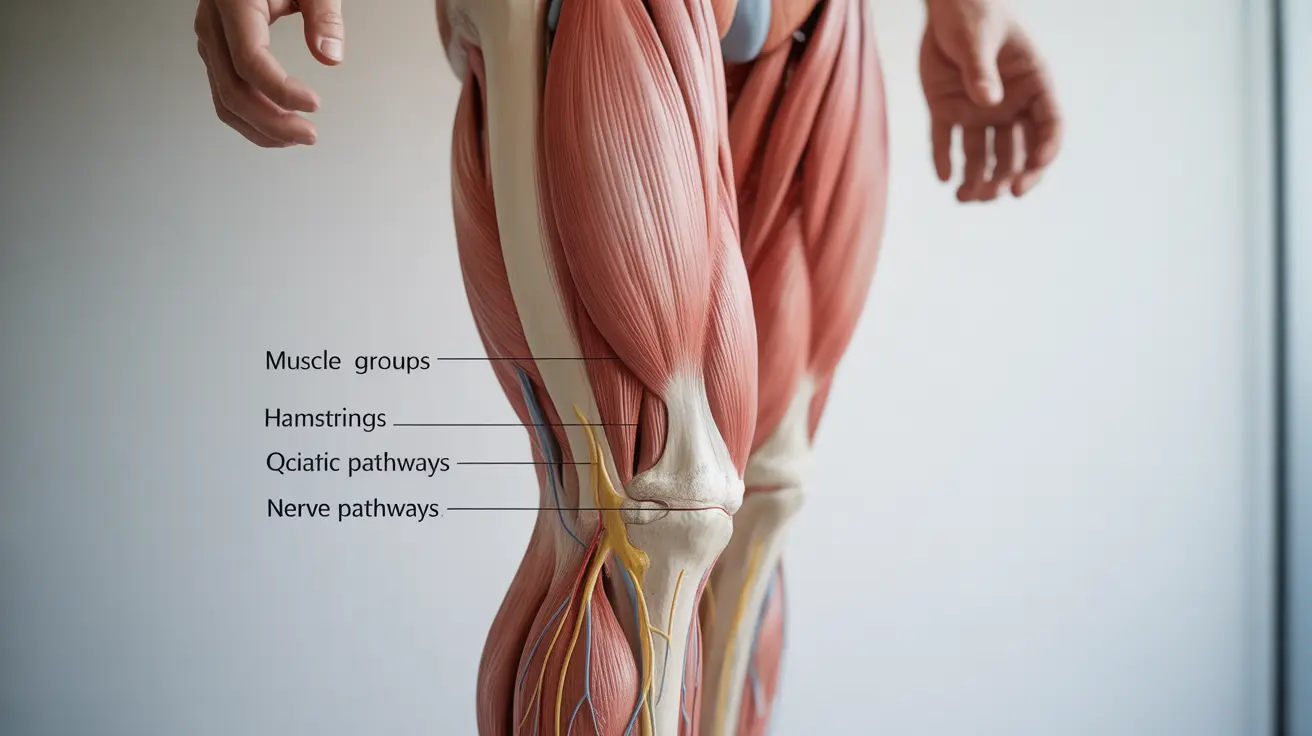Experiencing sharp pain in the thigh that comes and goes can be both concerning and frustrating. This type of intermittent pain can significantly impact daily activities and may signal various underlying conditions that require attention. Understanding the potential causes and available treatments is crucial for managing this uncomfortable symptom effectively.
While occasional leg pain is common, recurring sharp pain in the thigh deserves careful consideration, as it could indicate nerve compression, muscle injuries, or circulatory issues. This comprehensive guide will help you understand the various causes, recognize warning signs, and explore treatment options for intermittent thigh pain.
Common Causes of Sharp Thigh Pain
Several conditions can trigger sharp, intermittent pain in the thigh area:
Nerve-Related Causes
Nerve compression or irritation often results in sharp, shooting pain that comes and goes. Common nerve-related causes include:
- Sciatica
- Meralgia paresthetica
- Pinched nerves in the lower back
- Femoral nerve compression
Musculoskeletal Issues
Various muscle and bone conditions can lead to intermittent thigh pain:
- Muscle strains or tears
- IT band syndrome
- Hip bursitis
- Stress fractures
- Delayed onset muscle soreness (DOMS)
Circulatory Conditions
Blood flow problems can cause sharp pain in the thigh, particularly during activity:
- Peripheral artery disease (PAD)
- Deep vein thrombosis (DVT)
- Varicose veins
Diagnostic Considerations
Determining the exact cause of intermittent thigh pain often requires careful evaluation of symptoms and potential triggers. Healthcare providers typically consider:
- Pain characteristics (sharp, dull, burning, or tingling)
- Timing of pain episodes
- Activities that worsen or alleviate symptoms
- Associated symptoms
- Medical history
Treatment Options
Conservative Treatments
Many cases of intermittent thigh pain respond well to conservative treatment approaches:
- Rest and activity modification
- Physical therapy exercises
- Hot and cold therapy
- Over-the-counter pain medications
- Compression therapy
Medical Interventions
More severe cases may require professional medical treatment:
- Prescription medications
- Steroid injections
- Nerve blocks
- Physical therapy
- Surgery (in severe cases)
Prevention and Lifestyle Modifications
Several lifestyle changes can help prevent or minimize sharp thigh pain:
- Regular stretching and strengthening exercises
- Maintaining proper posture
- Using ergonomic furniture
- Wearing appropriate footwear
- Maintaining a healthy weight
- Staying physically active without overexertion
When to Seek Medical Attention
Certain symptoms warrant immediate medical evaluation:
- Severe or worsening pain
- Pain accompanied by swelling or redness
- Difficulty walking or bearing weight
- Numbness or tingling
- Pain that interferes with sleep or daily activities
- Signs of infection
Frequently Asked Questions
What are the most common causes of sharp pain in the thigh that comes and goes?
The most common causes include nerve compression (like sciatica), muscle strains, IT band syndrome, and circulatory issues such as peripheral artery disease. Each condition has distinct characteristics and may require different treatment approaches.
How can I tell if sharp thigh pain is due to nerve problems like sciatica or circulatory issues like peripheral artery disease?
Nerve-related pain typically feels sharp, shooting, or burning and may be accompanied by tingling or numbness. Circulatory issues often cause pain during activity that improves with rest and may include symptoms like leg fatigue or coolness in the affected limb.
What treatments are available for intermittent sharp pain in the thigh and leg?
Treatment options range from conservative approaches like physical therapy, pain medications, and stretching exercises to medical interventions such as steroid injections or surgery in severe cases. The appropriate treatment depends on the underlying cause.
When should I see a doctor for sharp, shooting pain in my thigh that keeps coming back?
Seek medical attention if the pain is severe, worsening, accompanied by swelling or redness, interferes with daily activities, or causes difficulty walking. Also consult a healthcare provider if you experience persistent numbness, tingling, or weakness.
How can lifestyle changes help prevent or reduce sharp intermittent thigh pain?
Regular exercise, proper stretching, maintaining good posture, using ergonomic furniture, wearing appropriate footwear, and maintaining a healthy weight can all help prevent or reduce intermittent thigh pain. Consistent physical activity without overexertion is also beneficial.




